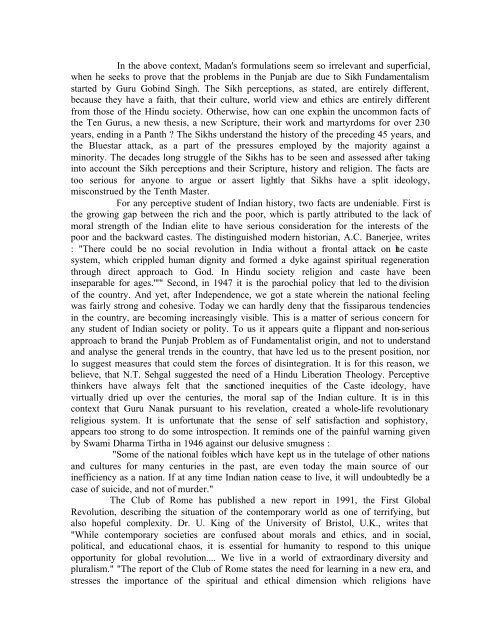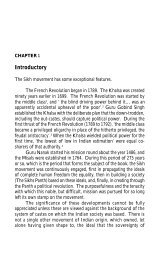Fundamentalism and the Sikh Religious Tradition by T.N. Madan
Fundamentalism and the Sikh Religious Tradition by T.N. Madan
Fundamentalism and the Sikh Religious Tradition by T.N. Madan
Create successful ePaper yourself
Turn your PDF publications into a flip-book with our unique Google optimized e-Paper software.
In <strong>the</strong> above context, <strong>Madan</strong>'s formulations seem so irrelevant <strong>and</strong> superficial,<br />
when he seeks to prove that <strong>the</strong> problems in <strong>the</strong> Punjab are due to <strong>Sikh</strong> <strong>Fundamentalism</strong><br />
started <strong>by</strong> Guru Gobind Singh. The <strong>Sikh</strong> perceptions, as stated, are entirely different,<br />
because <strong>the</strong>y have a faith, that <strong>the</strong>ir culture, world view <strong>and</strong> ethics are entirely different<br />
from those of <strong>the</strong> Hindu society. O<strong>the</strong>rwise, how can one explain <strong>the</strong> uncommon facts of<br />
<strong>the</strong> Ten Gurus, a new <strong>the</strong>sis, a new Scripture, <strong>the</strong>ir work <strong>and</strong> martyrdoms for over 230<br />
years, ending in a Panth ? The <strong>Sikh</strong>s underst<strong>and</strong> <strong>the</strong> history of <strong>the</strong> preceding 45 years, <strong>and</strong><br />
<strong>the</strong> Bluestar attack, as a part of <strong>the</strong> pressures employed <strong>by</strong> <strong>the</strong> majority against a<br />
minority. The decades long struggle of <strong>the</strong> <strong>Sikh</strong>s has to be seen <strong>and</strong> assessed after taking<br />
into account <strong>the</strong> <strong>Sikh</strong> perceptions <strong>and</strong> <strong>the</strong>ir Scripture, history <strong>and</strong> religion. The facts are<br />
too serious for anyone to argue or assert lightly that <strong>Sikh</strong>s have a split ideology,<br />
misconstrued <strong>by</strong> <strong>the</strong> Tenth Master.<br />
For any perceptive student of Indian history, two facts are undeniable. First is<br />
<strong>the</strong> growing gap between <strong>the</strong> rich <strong>and</strong> <strong>the</strong> poor, which is partly attributed to <strong>the</strong> lack of<br />
moral strength of <strong>the</strong> Indian elite to have serious consideration for <strong>the</strong> interests of <strong>the</strong><br />
poor <strong>and</strong> <strong>the</strong> backward castes. The distinguished modern historian, A.C. Banerjee, writes<br />
: "There could be no social revolution in India without a frontal attack on <strong>the</strong> caste<br />
system, which crippled human dignity <strong>and</strong> formed a dyke against spiritual regeneration<br />
through direct approach to God. In Hindu society religion <strong>and</strong> caste have been<br />
inseparable for ages.'"" Second, in 1947 it is <strong>the</strong> parochial policy that led to <strong>the</strong> division<br />
of <strong>the</strong> country. And yet, after Independence, we got a state wherein <strong>the</strong> national feeling<br />
was fairly strong <strong>and</strong> cohesive. Today we can hardly deny that <strong>the</strong> fissiparous tendencies<br />
in <strong>the</strong> country, are becoming increasingly visible. This is a matter of serious concern for<br />
any student of Indian society or polity. To us it appears quite a flippant <strong>and</strong> non-serious<br />
approach to br<strong>and</strong> <strong>the</strong> Punjab Problem as of Fundamentalist origin, <strong>and</strong> not to underst<strong>and</strong><br />
<strong>and</strong> analyse <strong>the</strong> general trends in <strong>the</strong> country, that have led us to <strong>the</strong> present position, nor<br />
lo suggest measures that could stem <strong>the</strong> forces of disintegration. It is for this reason, we<br />
believe, that N.T. Sehgal suggested <strong>the</strong> need of a Hindu Liberation Theology. Perceptive<br />
thinkers have always felt that <strong>the</strong> sanctioned inequities of <strong>the</strong> Caste ideology, have<br />
virtually dried up over <strong>the</strong> centuries, <strong>the</strong> moral sap of <strong>the</strong> Indian culture. It is in this<br />
context that Guru Nanak pursuant to his revelation, created a whole-life revolutionary<br />
religious system. It is unfortunate that <strong>the</strong> sense of self satisfaction <strong>and</strong> sophistory,<br />
appears too strong to do some introspection. It reminds one of <strong>the</strong> painful warning given<br />
<strong>by</strong> Swami Dharma Tirtha in 1946 against our delusive smugness :<br />
"Some of <strong>the</strong> national foibles which have kept us in <strong>the</strong> tutelage of o<strong>the</strong>r nations<br />
<strong>and</strong> cultures for many centuries in <strong>the</strong> past, are even today <strong>the</strong> main source of our<br />
inefficiency as a nation. If at any time Indian nation cease to live, it will undoubtedly be a<br />
case of suicide, <strong>and</strong> not of murder."<br />
The Club of Rome has published a new report in 1991, <strong>the</strong> First Global<br />
Revolution, describing <strong>the</strong> situation of <strong>the</strong> contemporary world as one of terrifying, but<br />
also hopeful complexity. Dr. U. King of <strong>the</strong> University of Bristol, U.K., writes that<br />
"While contemporary societies are confused about morals <strong>and</strong> ethics, <strong>and</strong> in social,<br />
political, <strong>and</strong> educational chaos, it is essential for humanity to respond to this unique<br />
opportunity for global revolution.... We live in a world of extraordinary diversity <strong>and</strong><br />
pluralism." "The report of <strong>the</strong> Club of Rome states <strong>the</strong> need for learning in a new era, <strong>and</strong><br />
stresses <strong>the</strong> importance of <strong>the</strong> spiritual <strong>and</strong> ethical dimension which religions have
















